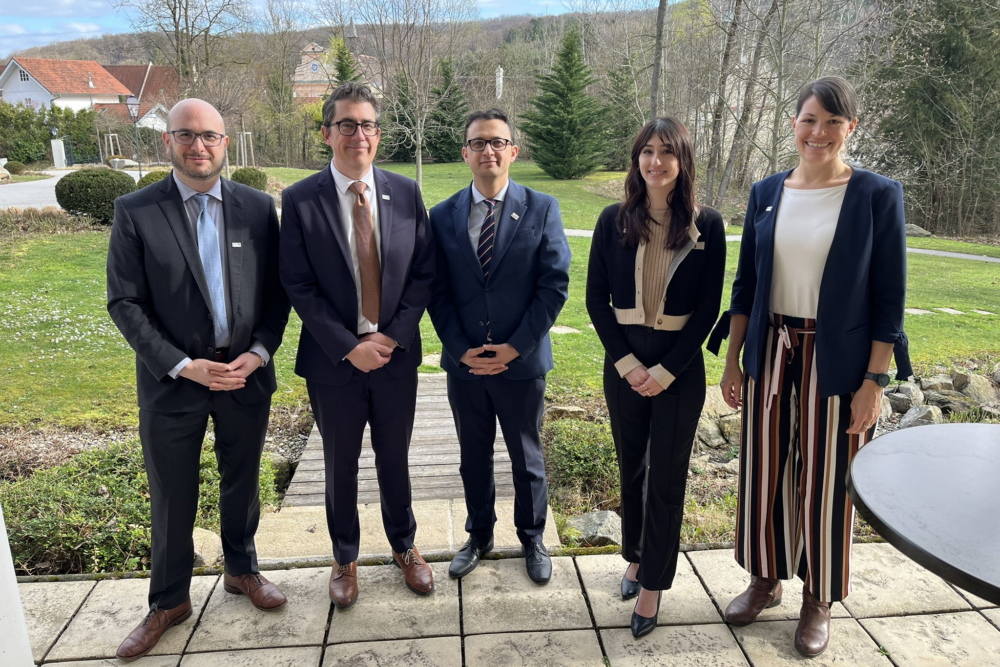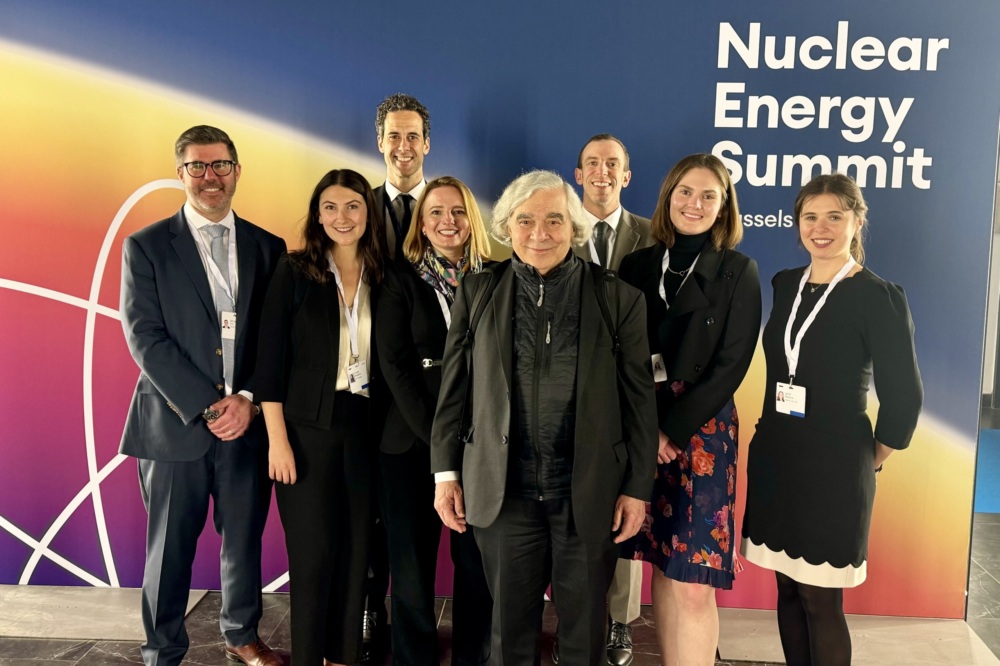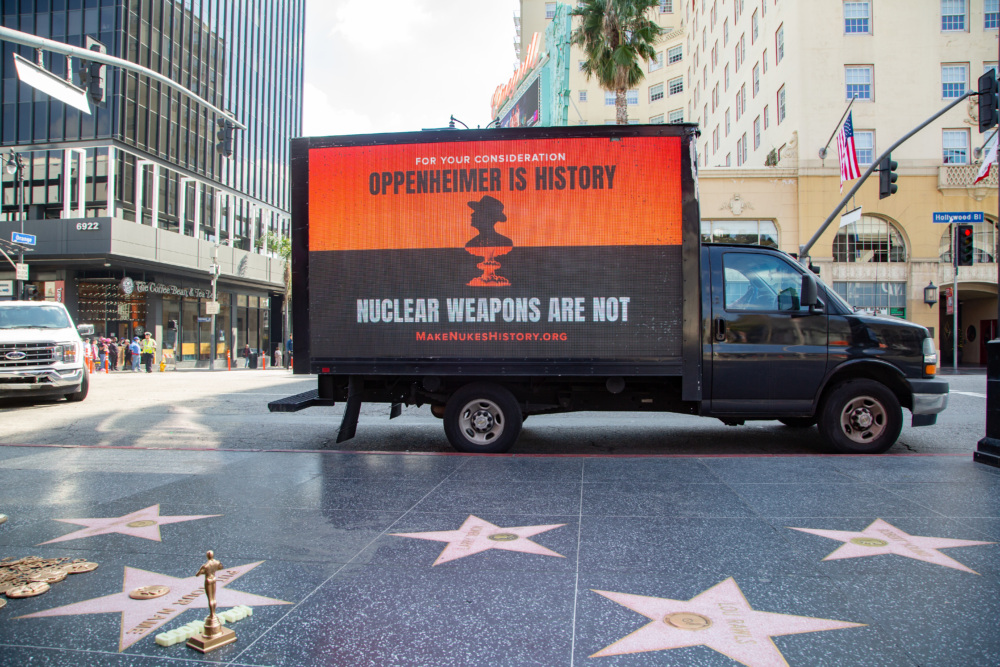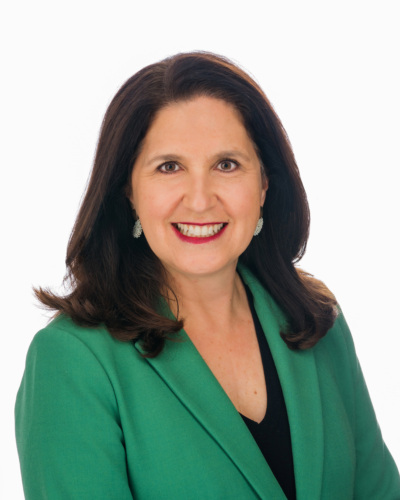NTI Opens Moscow Office – Announces Initial Projects With Russian Partners
Nuclear Threat Initiative (NTI) Co-Chairmen Ted Turner and Sam Nunn announced today initial projects with Russian partners designed to strengthen global security by reducing the threats from nuclear, biological and chemical weapons. These projects are included in a first round of funding commitments totaling nearly $6 million dollars devoted to Russian activities designed to:
-
accelerate the safeguarding and destruction of weapons and materials;
-
prevent the spread of nuclear and biological weapons and know-how;
-
bring U.S. and Russian scientists together to collaborate on counter-terrorism; and
-
develop a unique collaboration between a Russian Institute and an American university to conduct a joint course with Russian and American students on arms control and cooperative approaches to shared security problems.
“We are committed to working in Russia and pleased to be opening our Moscow office,” said Mr. Turner. “NTI’s goals are straightforward. We want to reduce toward zero the chance that weapons of mass destruction will ever be used against anyone, anywhere, whether by intent or accident. The projects we are announcing today are an important first step as we work together for a safer world.”
“Russia has enormous technical and scientific expertise, and Russia and the United States must join together in a global effort to secure weapons materials and weapons know-how,” Senator Nunn said. “NTI understands that the large-scale work of threat reduction must be done by governments. But we believe a private organization can make a significant contribution to help fill the large gap between the threat from these weapons and governments’ responses to the threat.”
NTI, which was established in January 2001, is a private international foundation funded by Mr. Turner and dedicated to reducing the global threats from nuclear, biological and chemical weapons. Deputy of the State Duma and former Secretary of the Security Council Andrei Kokoshin serves on NTI’s Board of Directors.
In addition to the specific activities named below, NTI is working to promote greater public awareness of the threat from weapons of mass destruction and the need for an urgent and more www.nti.org vigorous global response to the dangers posed by these weapons. NTI’s website at www.nti.org has an array of information – in English and Russian – on these threats and NTI’s work.
The following is a list of initial NTI projects in Russia:
Reducing Nuclear Threats
Fund for Development of Conversion Companies
To contribute $1 million to an existing Russian loan fund, known as the Fund for Development of Conversion Companies (FDCC), which has been established to create permanent, commercially viable new civilian business jobs in the closed nuclear city of Sarov. This award will expand by 30 to 40 percent current FDCC funds available in 2002 for loans to new or expanding businesses, and thereby create new jobs to replace nuclear weapons-related jobs that are being lost through downsizing.
Fund for Development of Conversion Companies (FDCC), Sarov, Russia
$1 million
Cooperation on Counterterrorism
To initiate and expand a broad effort on U.S.-Russian cooperation in counterterrorism and nonproliferation by building on the history of cooperation between U.S. and Russian scientists. The joint Academy initiative will especially focus on new efforts to collaborate on science and technology solutions to prevention, response and mitigation of catastrophic terrorism.
Russian Academy of Sciences, Moscow, Russia, and National Academy of Sciences, Washington
$1 million over two years
U.S.-Russian Nonproliferation Working Group
To establish a U.S.-Russian working group to create and identify shared interests and cooperative strategies for preventing the proliferation of weapons of mass destruction. The group’s agenda includes a summary and assessment of current U.S. and Russian government perspectives, a joint U.S.-Russian assessment of efforts to prevent proliferation over the past five decades, and a joint consideration of the role of nuclear weapons today.
Russian Council on Foreign and Defense Policy, Moscow, Russia and Belfer Center for Science and International Affairs, John F. Kennedy School of Government, Harvard University, Cambridge, MA, USA
Up to $497,500
Technical Nuclear Nonproliferation Workshop
To hold a technical workshop on nuclear nonproliferation in Moscow under the auspices of the Russian Academy of Sciences to engage the Russian scientific community in strengthening U.S.-Russian cooperation on scientific and technical aspects of proliferation prevention and help identify other opportunities for scientific and technical cooperation.
Russian Academy of Sciences, Moscow, Russia
$100,000
Preparing to Double Blend-down Rate of Excess Highly Enriched Uranium (HEU)
To fund a study of the options for accelerating the rate at which HEU from dismantled nuclear weapons is transformed into safe forms and for ultimate use in civilian power plants.
Facilities and Institutes of Russian Ministry of Atomic Energy, Moscow, Russia
Under discussion
Reducing Biological Threats
Brucellosis Vaccine Research
To support former Soviet weapons scientists in the development of a new brucellosis vaccine. In addition to vaccine research and development, this project will include development of a small animal model for vaccine testing, and a vaccine delivery system that will permit vaccination of wild animal populations. NTI funding is providing roughly half the current project budget, with the U.S. Defense Threat Reduction Agency as funding partner. The project is cooperatively managed with the U.S. Civilian Research and Development Foundation.
Research Center for Toxicology and Highly Pure Biopreparations in Serpukhov (RCT&HRB); State Research Center for Applied Microbiology in Obolensk (SRCAM); All-Russian Research Veterinarian Institute in Kazan (ARRVI), funded through the International Science and Technology Center, Moscow, Russia in conjunction with U.S. Defense Threat Reduction Agency
$1,300,000 (over two years)
Hepatitis Vaccine Manufacturing Feasibility Study
To conduct a feasibility study concerning the possible commercial manufacture of Hepatitis A, Hepatitis B, and Hepatitis A/B (bivalent) vaccines involving Russian professionals previously engaged in biological weapons work. Project includes the preparation of a preliminary business plan designed to attract commercial investors for building a new vaccine production facility at the State Research Center of Virology and Biotechnology VECTOR in Novosibirsk, Russia.
High Technology Foundation/Gorbachev Project, Moscow, Russia
$250,000
Integrating Scientists into the International Research Community
To support approximately twenty bioresearch scientists from the former Soviet Union to attend a variety of highly respected research conferences that bring together top scientists to present and discuss cutting-edge scientific research and ideas. The project enhances mutual understanding and contact between scientists from the former Soviet Union and the United States, and supports further integration of these scientists into the international research community. Select scientists will remain in the U.S. for a brief series of lectures at universities around the nation, following their conference.
Gordon Research Conferences, West Kingston, RI, USA
$80,000
Reducing Chemical Threats
Supporting Russian Chemical Weapons Destruction
To authorize a conditional pledge of $1 million dollars to aid high-priority infrastructure development for the Shchuchye Chemical Weapons Destruction Facility. Discussions are underway with the Russian Munitions Agency to work out the terms of the assistance.
Russian Munitions Agency, Moscow, Russia
A pledge of $1 million conditional on matching funds being raised
Promoting Education and Mutual Understanding
Collaborative Education and Cooperative Security: A Joint Curriculum Project on Reducing the Nuclear Threat
To develop a unique joint arms control curriculum to be taught at a Russian and an American institute of higher education. This project will bring together Russian and American security experts to develop joint curricular materials that compare current security problems with the Cold War experience, examine risks associated with ongoing operational practices and explore new cooperative security arrangements to move from deterrence to reassurance.
School for International Security and World Politics at the Institute of U.S.A. and Canada Studies in Moscow (ISKRAN) and the Center for International and Security Studies at Maryland (CISSM) at the School of Public Affairs, University of Maryland, College Park, MD, USA
$712,597 over two years
In addition to these activities, NTI is examining ways to help reduce Russian external debt and to take other steps designed to obtain additional international resource commitments to supplement on-going U.S.-Russian cooperative efforts.
Joining Ted Turner, Sam Nunn and Andrei Kokoshin on the NTI Board of Directors are:
-
Charles Curtis, President and Chief Operating Officer;
-
U.S. Senator Pete Domenici;
-
Susan Eisenhower, President of the Eisenhower Institute;
-
Rolf Ekeus, former Swedish Ambassador to the U.S., currently with the Stockholm International Peace Research Institute;
-
Eugene Habiger, retired U.S. Air Force General and former Commander-in-chief of the U.S. Strategic Command;
-
U.S. Senator Richard G. Lugar;
-
Dr. Jessica Mathews, President of the Carnegie Endowment for International Peace;
-
William Perry, former U.S. Secretary of Defense, currently at Stanford University;
-
Dr. Amartya Sen, recipient of the Nobel Prize in Economics and native of India, who has conducted research in a wide range of fields including economics, philosophy and decision theory; and
-
Dr. Nafis Sadik, a national of Pakistan, who is past executive director of the United Nations Population Fund, with the rank of under secretary general.
NTI has offices in Washington, D.C. and Moscow. NTI’s new Moscow office is located at:
Stoleshnikov pereulok 14
103031 Moscow
Russia
+7-495-258-8660
###




